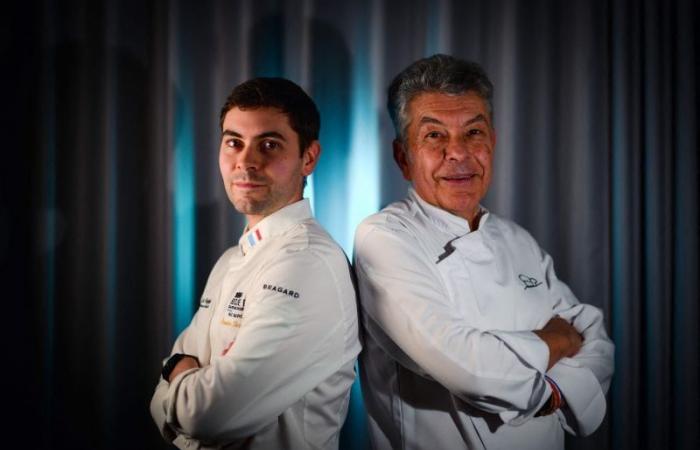Since 1987, the prestigious French Bocuse d’or competition has been the playground for the world’s best chefs. But also a growing tool of political influence for countries whose gastronomies are sharpening, competing with French hegemony.
On the Avenue des Champs-Élysées, in Paris, on November 27, at the Pavillon Ledoyen, restaurant of three-star chef Yannick Alléno, “Team France” gave a reception to thank the donors who have financed the training of its team for 15 months. candidate Paul Marcon, son of three-star chef Régis Marcon. The Bocuse d’or, “it’s the elite”, “the Olympic Games of cooking”, enthuses Romuald Fassenet, best worker in France and president of “Team France”, met on this occasion.
On January 26 and 27, for more than five hours, the finalists will compete in front of the public at Sirha, the World Food and Gastronomy Trade Fair, in Lyon, in the south-east of France.
The level of this marathon competition, created in 1987 by the legendary chef Paul Bocuse (1926-2018), continues to increase. To design their dishes, the chefs work with designers and scientists. The French currently hold the record for victories. But, in recent years, the Nordic countries, which promote a more minimalist gastronomy, adapted to ecological issues, have taken the lion’s share.
Make it shine
“France was looking at its navel” but “the people around them have moved forward,” says Davy Tissot, winner of the Bocuse d’or 2021. The Scandinavian countries were the first to invest massively in the training of young people to win the tests. The Danish candidate, Sebastian Holberg Svendsgaard, whose country won the last edition, was assistant to two previous contenders for the Bocuse d’or and a member of the junior teams. “They understood that gastronomy was a real subject” to “make their countries shine” other than through the fjords and the Northern Lights,” continues Mr. Tissot.
In the 1990s, French candidates “trained at night,” he whispers.
“Today, we have the means” and “social security for the clerk,” says Romuald Fassenet. Six hundred thousand euros of private and public funding were raised to dedicate Paul Marcon, 28, and his team full time to the preparation of the tests, the required products of which are venison, foie gras, tea, celery… A “Clairefontaine of gastronomy” (inspired by the name of the national training center for French footballers), this time dedicated to the training of professionals in the food professions for international competitions, was initiated in 2022 and will officially be launched Wednesday.
-« Gastrodiplomacy »
A subject taken seriously at the top of the State. Emmanuel Macron was the first head of state to attend the competition, in 2021, and will still follow the final “very closely”, according to Guillaume Gomez, former chef of the kitchens of the Élysée and personal representative of the president in matters of gastronomy.
“France is practicing gastrodiplomacy through this competition,” explains Vincent Marcilhac, lecturer in food geography at Cergy Paris University. A neologism which represents the efforts of countries to promote their cuisine, a tool of tourist influence.
Operations in embassies, “haute gastronomy plan”… France is pulling out all stops to counter a “French Bashing” on a supposed decline in French cuisine, born in 2003 in the context of Paris’ opposition to the war in Iraq, to “weaken its international soft power”, according to Mr. Marcilhac. “The Eiffel Tower or the Loire castles are very beautiful. But is it more beautiful than the pyramids of Egypt? » asks Guillaume Gomez. “What makes the difference is the Camembert, the champagne, the red wine, the macaron, the croissant. » Because, in the world’s leading tourist destination, catering is not just the symbol of an art of living but an economic sector which represents 35.6 billion euros in turnover.
France in gastronomy, “it’s like Brazil in football, we want to beat it”, dares Romuald Fassenet, who emphasizes that French kitchens train a lot of foreign chefs. “We are not sitting on our laurels. »
Clara GUILLARD/AFP
Since 1987, the prestigious French Bocuse d’or competition has been the playground for the world’s best chefs. But also a growing tool of political influence for countries whose gastronomies are sharpening, competing with French hegemony. On the avenue des Champs-Élysées, in Paris, on November 27, at the Pavillon Ledoyen, restaurant of the three-star chef …
- --





